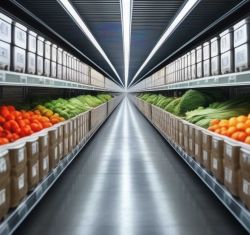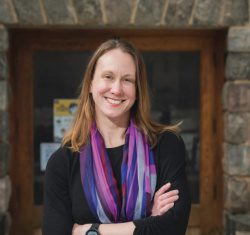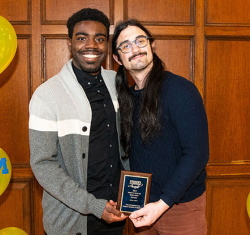
 back to all faculty
back to all faculty
Shelie Miller

About
(she/her/hers)
Miller’s research uses life cycle assessment (LCA) and scenario modeling tools to identify potential unintended environmental consequences of emerging technologies and find design or policy interventions that may lead to sustainable outcomes. She is particularly interested in understanding how consumer behavior patterns can influence the environmental outcomes of products. Her work spans a variety of topics including the food-energy-water nexus, plastic packaging, food waste, refrigeration and air conditioning, the urban-rural sustainability divide, and e-commerce.
Publications
Miller SA, The capabilities and deficiencies of life cycle assessment to address the plastic problem, Frontiers in Sustainability, 2022, 3: 1007060. (https://www.frontiersin.org/articles/10.3389/frsus.2022.1007060/full)
Kan M, Miller SA. Environmental impacts of plastic packaging of food products, Resources, Conservation & Recycling, 2022, 180: 106156. (https://www.sciencedirect.com/science/article/abs/pii/S0921344922000040)
Fetner H*, Miller SA, Environmental payback periods of reusable alternatives to single-use plastic kitchenware products, The International Journal of Life Cycle Assessment, 2021, 8: 1-17.
Dong Y, Coleman M, Miller SA. Greenhouse gas emissions from air conditioning and refrigeration service expansion in developing countries, Annual Review of Environment and Resources, 2021, 46: 59-83
(https://www.annualreviews.org/doi/10.1146/annurev-environ-012220-034103)
Miller SA. Five misperceptions surrounding the environmental impacts of single-use plastic, Environmental Science & Technology, 2020, 54 (22): 14143-51 (https://pubs.acs.org/doi/10.1021/acs.est.0c05295)
Heard BR, Miller SA. Potential changes in greenhouse gas emissions from refrigerated supply chain introduction in a developing food system, Environmental Science & Technology, 2019, 53(1): 251-260.
- 2016 NSF UNS Program, U.S.-China: Integrated Systems Modeling of Food-Energy-Water (FEW) Nexus for Urban Sustainability, $499,990, PI: Ming Xu
- 2011 NSF Environmental Sustainability Program, Developing a Spatially-Explicit Agent-Based Life Cycle Analysis Framework for Improving the Environmental Sustainability of Bioenergy Systems, $310,000, 9/1/2011-8/31/2014 PI: Ming Xu, University of Michigan
- 2011 Argonne National Laboratory, Update Material Production Modules in GREET 2 Model, $100,000, 5/3/11-9/30/11, PI: Greg Keoleian, University of Michigan
- 2010 NSF Science Master's Program: Sustainable and Resilient Infrastructure, $700,000 6/1/2010-5/31/2014, PI: Ronald Andrus, Clemson University
- 2009 NSF CAREER Program, Creation of Predictive and Dynamic Life Cycle Assessment Tool; $403,000, 1/1/2009-12/31/2014, PI: Shelie Miller
- 2009 NSF Environmental Sustainability Program, Workshop Proposal: Land Use and Geospatial Aspects of Life Cycle Assessment; $80,000 1/1/2009-12/31/2009; PI: Tom Seager, RIT
Jefferson Science Fellow, National Academies of Sciences, Engineering, and Medicine
Presidential Early Career Award for Scientists and Engineers (PECASE), White House Office of Science and Technology Policy
Kavli Frontiers Fellow, National Academy of Sciences
PhD, University of Illinois at Chicago (Civil and Materials Engineering)
ME, Clarkson University (Civil and Environmental Engineering)
BS, Denison University (Chemistry)
Biomass Research and Development Technical Advisory Committee (2015-Present).
Steering Committee, Academic Engagement in Public and Political Discourse, University of Michigan, (2013-15).
Nominating Committee, International Society of Industrial Ecology (2011-14).









